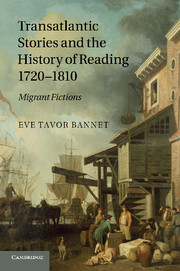Book contents
- Frontmatter
- Contents
- List of illustration
- Acknowledgments
- Introduction: Transatlantic stories and Transatlantic readers
- PART I “POOR MAN'S COUNTRY”
- 1 Strange adventures
- 2 Captivity and antislavery
- 3 The parallel Atlantic economy
- 4 Fortune's footballs
- PART II THE SERVANT'S TALE
- PART III PRINTSCAPES
- Afterword
- Notes
- Works cited
- Index
3 - The parallel Atlantic economy
Published online by Cambridge University Press: 05 July 2011
- Frontmatter
- Contents
- List of illustration
- Acknowledgments
- Introduction: Transatlantic stories and Transatlantic readers
- PART I “POOR MAN'S COUNTRY”
- 1 Strange adventures
- 2 Captivity and antislavery
- 3 The parallel Atlantic economy
- 4 Fortune's footballs
- PART II THE SERVANT'S TALE
- PART III PRINTSCAPES
- Afterword
- Notes
- Works cited
- Index
Summary
Much of Europe's exploitation of Spain's American empire rested on smuggling, on corruption, on fraud of all kinds, the magnitude of which … created in effect a parallel economy independent of the official system.
(Bailyn, Atlantic History: 88)Chetwood's Captain Boyle (1726) and Longueville's The Hermit (1727) both celebrated the happiness of denizens of the Atlantic world who lived outside the empire of British law. Both returned to the Historicall as epitomized Crusoes understood it: they presented themselves as stories based on “real Matter of Fact,” where “there are no Embellishments, nor one Step out of the Road of Truth.” The Voyages and Adventures of Captain Robert Boyle, in Several Parts of the World, Intermixed with the Story of Mrs Villars coopted Penelope Aubin's earlier market success by “intermixing” romance elements and interpolated character histories with its historically and geographically grounded circum-Atlantic frame story à la epitomized Crusoe. But Chetwood used this generic combination to exclude his heroine from Adventure, the Atlantic, and all pretension to heroism, and to deny her the heady freedom and extra-legal successes he granted his roving, enterprising hero. As a result, the romance elements rapidly become separated from the “Voyages and Adventures,” to be confined exclusively to the characters' interpolated histories of past events. Longueville entirely ignored the presence of women in the Atlantic as well as the generic possibilities of Romance. But, in juxtaposing three different genres in the three parts of his story, he altered the pattern of circum-Atlantic adventure narratives by devoting a full third of his text to describing and critiquing what had happened in Britain to compel his unwilling hero to leave home and try his fortunes in the Atlantic.
- Type
- Chapter
- Information
- Transatlantic Stories and the History of Reading, 1720–1810Migrant Fictions, pp. 65 - 86Publisher: Cambridge University PressPrint publication year: 2011



